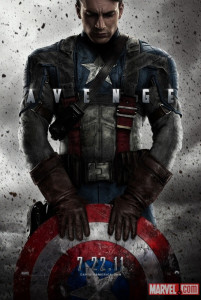Captain America and Superhero Worldviews, Part 1
In elementary school I was known in class as Kenny Samples, a quiet and mild-mannered child. But during recess I transformed into my alter ego: Marvel comics superhero Captain America. On the playground of Carver Elementary School I battled daily my archnemesis The Red Skull (believed to be Adolf Hitler’s alter ego).

My father’s participation in World War II as a combat soldier clearly influenced my childhood attachment to Captain America, a WWII era superhero. I’ll never forget as a child seeing the three medals my father received for his service in the bloodiest war in human history. In fact, as a kid I viewed my dad as a real-life Captain America.
Looking back I realize that reading Captain America comic books helped inculcate in me a type of worldview thinking. As a child, my coalescing world-and-life view was more profoundly influenced by my family’s commitment to Catholic Christianity and by our family’s deep respect for what thinker Dennis Prager calls “the trinity of American values” as expressed on American currency: Liberty, E Pluribus Unum (“out of many, one”), and In God We Trust. And the fictional Captain America embodied all those values in a super-human way.
Superheroes and Ethics
In exploring the moral dimension of life, philosophers discuss what is known as “The Five Problems of Ethics.” These powerful interrogatives seek to unveil that which anchors life’s deepest ethical commitments. For what is good (ethics) cannot exist in a metaphysical (relating to reality) and epistemological (relating to truth) vacuum. One’s view of appropriate human conduct has a lot to do with what one thinks about reality and truth. In other words, one’s ethical views are greatly impacted by one’s broader and more comprehensive worldview.
The Five Problems of Ethics:
- What characterizes human nature?
- What is the greatest good?
- How is the greatest good known?
- What motivates and restrains moral choices?
- Do human beings possess the freedom of the will?
In part 2 of this series, I will attempt to provide answers drawn from the newest superhero movie, Captain America: The First Avenger (released July 22, 2011). And we’ll see how the latest big-screen version of Captain America corresponds with how I fondly remember him from childhood.
Endnotes
- For more on how comic book superheroes are understood in light of Christian worldview thinking, see The Gospel According to Superheroes: Religion and Popular Culture written by my friend and former Christian Research Institute colleague B. J. Oropeza.
- For more on Christian worldview analysis, see my book A World of Difference: Putting Christian Truth-Claims to the Worldview Test.





